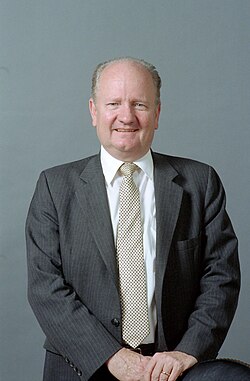Gaston Sigur
| Gaston J. Sigur Jr. | |
|---|---|
 |
|
| Assistant Secretary of State for East Asian and Pacific Affairs | |
|
In office March 12, 1986 – February 21, 1989 |
|
| President | Ronald Reagan |
| Preceded by | Paul Wolfowitz |
| Succeeded by | Richard H. Solomon |
| Personal details | |
| Born |
Gaston Joseph Sigur Jr. November 13, 1924 Franklin, Louisiana |
| Died | April 26, 1995 (aged 70) Bethesda, Maryland |
| Political party | Republican |
| Spouse(s) | Estelle Sigur |
| Children | Christopher Sigur Gaston J. Sigur, III Paul Sigur Katherine Dayton Thomas Sigur |
| Military service | |
| Service/branch |
United States Army United States Army Air Forces |
| Years of service | 1943–46 |
Gaston Joseph Sigur Jr. (pronounced Seeg-YOOR; November 13, 1924 – April 26, 1995) was the United States Assistant Secretary of State for East Asian and Pacific Affairs from 1986 to 1989.
Sigur was born in Franklin, Louisiana on November 13, 1924. His post-secondary education began at Louisiana State University at the age of 16 in 1941. In 1943, he joined the United States Army and was pulled from regular duty after basic training to study Japanese at the University of Chicago, the University of Michigan, and at Fort Snelling where he was commissioned. At that time the war was over and Sigur was sent to Japan where he served as an Army Air Force intelligence officer for Tachikawa Air Base during the Occupation of Japan until 1946 when he was discharged.
Back in the United States, Sigur returned to the University of Michigan where he earned the B.A., M.A., and Ph.D. in History, concentrating in Far Eastern history. He met Estelle Smotrys, a nursing student, while pursuing his doctorate and the two were married prior to him completing his studies.
After graduating he worked with The Asia Foundation from 1956 to 1959 and as a research scholar at Sophia University in Tokyo from 1959 to 1961. In 1962, Sigur moved his family to Afghanistan where he served as The Asia Foundation representative to Afghanistan until 1966; after which he continued his work for The Asia Foundation in Japan and San Francisco. In 1972, he became professor of international affairs and director of the Institute of Sino-Soviet Studies at George Washington University in Washington, D.C.
...
Wikipedia
